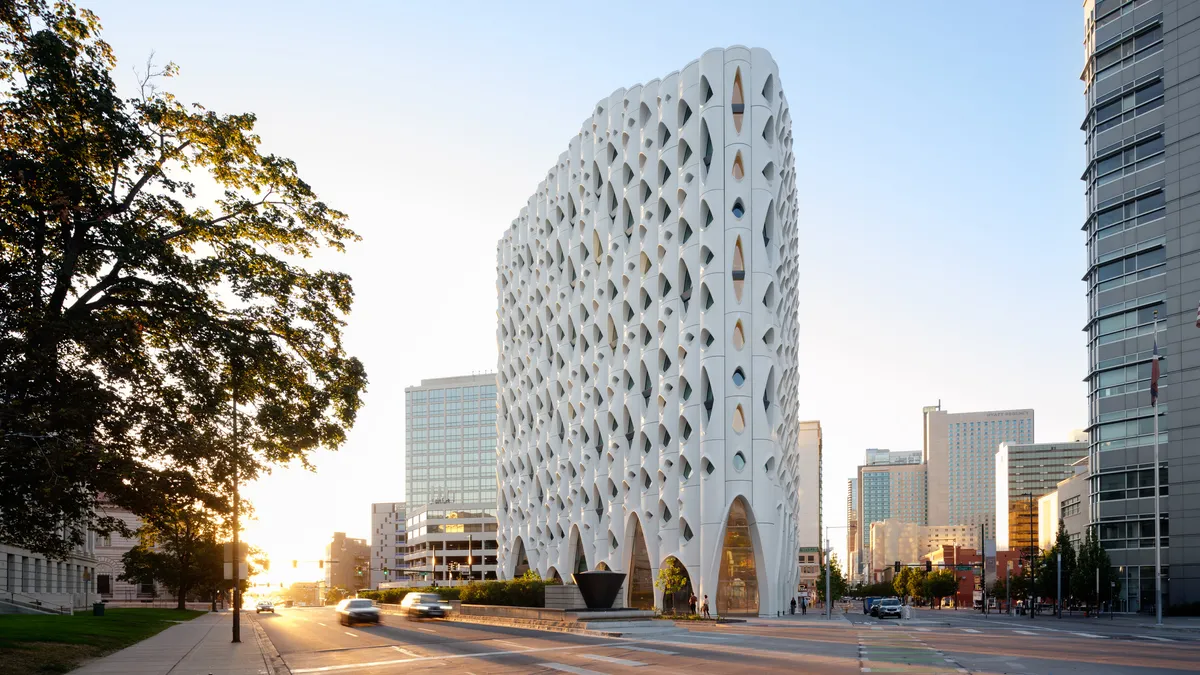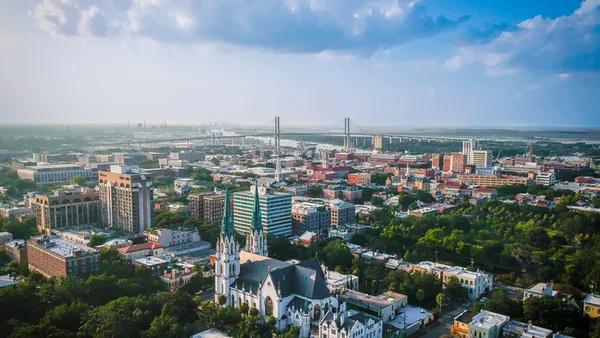Dive Brief:
- Environmentally conscious hotel Populus has opened in downtown Denver two years after real estate developer Urban Villages broke ground on the property, Aparium Hotel Group announced Wednesday.
- The 265-room property features biophilic architecture inspired by Colorado’s native aspen tree, as well as two restaurants and flexible meetings and events space.
- Populus, which plants a tree for every stay, claims to be the first “carbon positive” hotel in the U.S., going a step further than other properties prioritizing sustainability initiatives.
Dive Insight:
Populus features aspen tree-inspired design by Studio Gang. Lifestyle hotel operator Aparium Hotel Group is managing the property.
Studio Gang designed the hotel to be “as functional as it is striking,” according to the release. The building's windows feature “lids” that extend outward to shade the building’s interior. Guest rooms have views of the nearby state Capital, Civic Center Park and the Rocky Mountains.
Denver-based landscape architecture firm Superbloom designed the property’s roof garden and streetscape, which include plants that support biodiversity and a canopy of trees that create a cooling effect.

The hotel’s interiors — led by Wildman Chalmers Design and Fowler Architecture Design — are intended to minimize the building’s carbon footprint through consciously sourced materials, such as wood from reclaimed fencing and carpet from recycled materials.
The property’s food and beverage concepts are all-day dining restaurant Pasque and rooftop restaurant bar Stellar Jay.
Populus said its opening ushers in a “new era of eco-conscious travel.” Speaking to The Guardian, University of Colorado Environmental Studies Professor Joel Hartter said, “On paper, it looks great. But it would take a lot of research to verify those claims.”
However, Jay Arehart, an architectural engineering professor at the University of Colorado Boulder, told The Guardian that Populus is “a great pilot program that could definitely set a precedent.”
Populus says its hotel is carbon positive because it “goes beyond net-zero to help the planet regenerate and thrive.” In addition to planting one tree for every stay in partnership with the National Forest Foundation, the hotel has already planted 70,000 trees in Colorado’s Gunnison County as part of a reforestation effort following a beetle kill event that wiped out trees.
Beyond tree planting, Populus has purchased 7,000 tons of certified carbon credits.
Operationally, Populus plans to offset its lifetime carbon footprint by collaborating with local farms, using 100% renewable energy and turning all food waste into compost. An on-site biodigester diverts food waste from landfills, turning it into usable compost for local farms. The hotel has also committed 1% of restaurant sales to regenerative farming.
Hotels are increasingly prioritizing carbon-reduction measures, and many have set company-wide sustainability goals, such as Marriott International’s plan to cut the amount of waste it sends to landfills by 45% by the end of 2025.
The zero-emissions Hotel Marcel, meanwhile, has said going fossil fuel-free has been good for business, as travelers and event organizers seek lower-impact options.










